Introduction
In this series of interviews, prominent climate scientists share how and why they communicate, the risks they are taking by publicly engaging in the climate discussion, and how their outreach activities have affected each of them personally and professionally. As the series continues, you’ll see that no matter where they stand on the science, they all have a great deal in common.
 1. Tell me about your research focus / area of expertise in 140 characters or less.
1. Tell me about your research focus / area of expertise in 140 characters or less.
Whether it is snowstorms, windstorms, heavy rain or tornadoes, I don’t make the weather forecasts. I do research to help make the forecasts better.
2. How do you view your role in communicating science?
I see my role in communicating science in four ways.
The first is to help my graduate students and postdocs develop better communication skills through the papers that they write and the presentations that they deliver. That’s what all good advisors should be doing, so perhaps that is an obvious answer.
The second is to help undergraduates in developing better communication skills, specifically through writing. Many undergraduates are never taught properly how to write even the simplest essay. Yet, in the United Kingdom, they are expected to deliver these 30-page research dissertations at the end of their third year. Even if they leave science, proper writing skills will benefit them in whatever career they have. We don’t do enough to prepare them, so it’s been my goal to improve that within our School.
The third is to help improve the written communication through the scientific journals. I’ve served as a decision-making editor at five different journals in my career, and I believe that a good editor is one who is involved in the review process and works in conjunction with the authors and reviewers to improve submitted manuscripts. My biggest satisfaction is seeing articles that would not have been published without the work that the authors, reviewers and I have done to improve it.
The fourth is to enter into a dialog with the public about my research and atmospheric science, in general. The public has a natural curiosity about the weather because it affects them every day. Yet, they may not know much about how the atmosphere works and why it rains, for instance. I think talking with the public to find out what they know, what their misconceptions are, and helping them learn and be fascinated by the science and beauty of the weather is one of the most satisfying things that I can do.
3. In your view, how has your role in communicating science changed in the past 10 years?
My role in communicating science has changed a lot over the past ten years because my job has changed a lot over the past ten years. Ten years ago, I was a research scientist at a government research laboratory in Oklahoma. Now, I am a full professor at the largest university in the United Kingdom. Although I still enjoy doing research myself, I rarely have time for that anymore. So, I have to live vicariously through my students and postdocs! They are the ones now presenting their science at meetings, talking at schools and Brownie events, attending science fairs and interacting with the public. So, my job is to give them the skills that they need to be successful in these various enterprises.
That said, they are much more adept than me at some things: developing beautiful and effective graphics, communicating through social media, developing software applications to get students and the public involved in the wonders of meteorological and climate modeling.
4. Do you think it’s important for scientists and other researchers to be directly involved in outreach activities? If so, why?
Doing outreach activities is important because it keeps you in touch with the people who are funding your research. You want them to understand and appreciate what you do, but you should also be proud enough of your own work to tell others about it, even if they aren’t scientists. Anything we can do to help improve public understanding of science is good for society. Plus, when the public comes away from talking with a scientist having learned something, they are less scared of learning about science in the future.
Interacting with the public also leads to quite a bit of feedback that I simply would not have considered. For example, I’ve learned a lot about what the public thinks of my science. I’ve had some people come up to me after my talk and say, “Wow, I didn’t realize that there was so much science and math in weather forecasting.”
5. Do you use social media for science outreach? If so, how do you use social media – and why?
I have a Twitter account @EloquentScience that I mostly use to talk about science communication issues. It developed out of my book Eloquent Science: A Practical Guide to Becoming a Better Writer, Speaker, and Atmospheric Scientist. Although I mostly dwell on how scientists talk to each other, if you can improve the way we write and talk about science to each other, the benefits of talking to the public follow from that. Speaking to the public is a more down-to-earth approach to talking about science. Take away the veil of jargon and you are forced to explain things simply. And, I believe that most science is simple enough to communicate to the layperson.
These skills of speaking to a nonspecialist audience are transferable to our communications with other scientists. I think scientists that are really good at communicating to the public tend to be better writers of journal articles and presenters at scientific conferences, as well. There is a great feedback between the two.
 6. Do you think social media (social networks, blogs, etc.) add value to scientific discussions?
6. Do you think social media (social networks, blogs, etc.) add value to scientific discussions?
Absolutely. I haven’t used it much for communicating my own science, but I can see that blogs can be useful for showing active discussion about interesting and controversial new research ideas.
7. Have your outreach activities had an impact on your scientific research? Are there any examples of positive or negative impacts you’ve experienced personally?
Yes. Through talking with the public about my science, I’ve seen that some concepts that are commonly presented as fact in the media are wrong. For example, consider the prevalence of tornadoes in the central United States. Common media explanations are that tornadoes result from “the clash of the air masses” (warm air from the Gulf of Mexico meeting cooler air from the polar regions). We know this isn’t right, but even after millions of dollars of research into tornadoes and a large public outreach effort with the field research program VORTEX2, the media still gets it wrong. Why? So, we wrote an article in the Bulletin of the American Meteorological Society and are on a crusade to get people to think about tornadoes in a realistic manner. I hope we succeed.
8. Have you ever come across scientific misinformation or misconceptions, online or elsewhere, which you addressed directly? How did you do it, and what was the result?
See above.
The other thing I did was use an invitation to talk on the Paul Hudson Weather Show on BBC York to develop a series called “Urban Legends of Meteorology”. In there, I explore a bunch of outdated ideas that have incredible persistence. Examples include: not touching someone who is struck by lightning because they might transfer their charge to you, the Gulf Stream leads to the warm climate of western Europe, and tornadoes avoid urban areas. I actually received a piece of fan mail encouraging me to continue debunking bad science.
9. What do you consider to be the most effective and ineffective ways to disagree about scientific topics?
Effective: Comments and replies in journals. Massively underused, but can be nasty and time-consuming. I would like to see more scientific arguments occur in the scientific literature. Blogs can also be effective tools, although there is no sort of peer review there.
Ineffective: Public debates between sides that are clearly unequal in standing.
10. Individuals in the scientific community and the public are often labeled and grouped depending on their particular views. What do you consider to be the impact of these groupings?
To the extent that these groups are homogeneous, labels can be useful to identify common sets of beliefs. But, when people are inappropriately labeled as members of a group because they hold unpopular but reasoned ideas, then that’s when the utility of these labels breaks down. I think we need to be careful about lumping everyone who doesn’t agree with us into a camp that allows us to summarily dismiss them.
 11. Please share your thoughts on the future of science communication as a vehicle for enhancing public trust in science? What should the path forward look like?
11. Please share your thoughts on the future of science communication as a vehicle for enhancing public trust in science? What should the path forward look like?
It’s disappointing to see that the public trust in scientists as a whole has been dropping, even as it is more cool now to be a nerd/scientist. I’m sure that more than one factor is involved, so solutions will need to address multiple facets of the problem. I am also confident that much of the problem is caused by a few bad apples and is not characteristic of scientific enterprise as a whole. So, what the good apples need to do is make whatever appeals they can through whatever venues they have to remind people about the high standards we set for ourselves within science.
I see three points that scientists should discuss when they have the opportunity.
- Peer review is an important gate through which scientific research must pass. The public should be wary of research that is not published in a respectable peer-review journal, but comes out as a press release or a media report from a conference.
- That being said, not all research that gets published is correct. The public should recognize that the evaluation of published scientific claims takes time.
- There is often a large disconnect between the sensationalism of press releases and the careful wording in scientific journal articles. Articles often contain caveats and limitations that press releases omit. So, everyone needs to be a bit careful about latching onto the latest press release and taking it as the truth.
Additional Resources for Dr. David Schultz:
Personal Web Page
Eloquent Science Blog
Twitter: @EloquentScience
ManUniCast: Real-time weather and air-quality forecasting over the UK and Europe











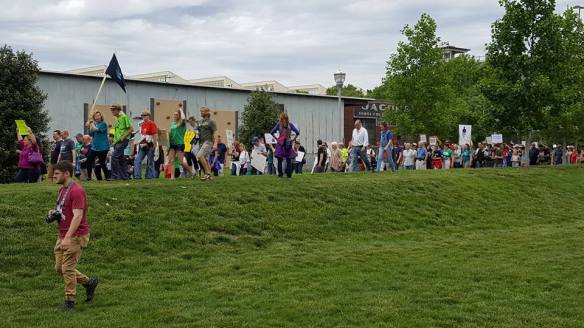

 1. Tell me about your research focus / area of expertise in 140 characters or less.
1. Tell me about your research focus / area of expertise in 140 characters or less. 6. Do you think social media (social networks, blogs, etc.) add value to scientific discussions?
6. Do you think social media (social networks, blogs, etc.) add value to scientific discussions? 11. Please share your thoughts on the future of science communication as a vehicle for enhancing public trust in science? What should the path forward look like?
11. Please share your thoughts on the future of science communication as a vehicle for enhancing public trust in science? What should the path forward look like? 1. Tell me about your research focus / area of expertise in 140 characters or less.
1. Tell me about your research focus / area of expertise in 140 characters or less. 5. Do you use social media for science outreach? If so, how – and why?
5. Do you use social media for science outreach? If so, how – and why? 8. What do you consider to be the most effective and ineffective ways to disagree about scientific topics?
8. What do you consider to be the most effective and ineffective ways to disagree about scientific topics? 1. Tell me about your research focus / area of expertise in 140 characters or less.
1. Tell me about your research focus / area of expertise in 140 characters or less.  5. Do you use social media for science outreach? If so, how do you use social media – and why?
5. Do you use social media for science outreach? If so, how do you use social media – and why?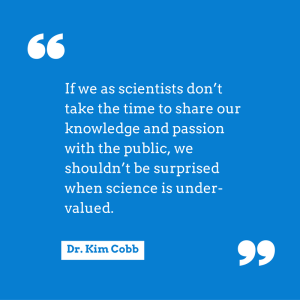 12. Please share your thoughts on the future of science communication as a vehicle for enhancing public trust in science? What should the path forward look like?
12. Please share your thoughts on the future of science communication as a vehicle for enhancing public trust in science? What should the path forward look like? 1. Tell me about your research focus / area of expertise in 140 characters or less. (1 Tweet)
1. Tell me about your research focus / area of expertise in 140 characters or less. (1 Tweet)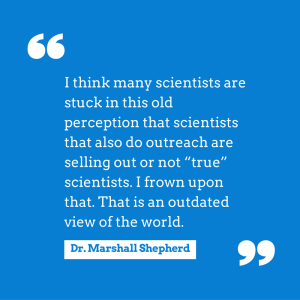 5. Do you use social media for science outreach? If so, how do you use social media – and why?
5. Do you use social media for science outreach? If so, how do you use social media – and why? 10. Public trust in science is critical. What role do you believe both consensus and disagreement play in building or eroding that trust?
10. Public trust in science is critical. What role do you believe both consensus and disagreement play in building or eroding that trust? 1. Tell me about your research focus / area of expertise in 140 characters or less.
1. Tell me about your research focus / area of expertise in 140 characters or less.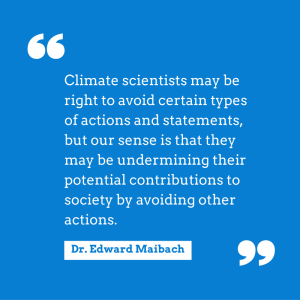 7. Have your outreach activities had an impact on your scientific research? Are there any examples of positive or negative impacts you’ve experienced personally?
7. Have your outreach activities had an impact on your scientific research? Are there any examples of positive or negative impacts you’ve experienced personally?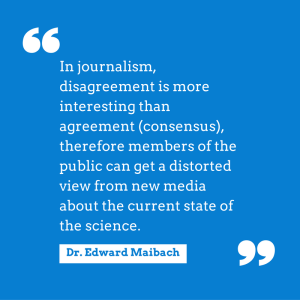 10. Public trust in science is critical. What role do you believe both consensus and disagreement play in building or eroding that trust?
10. Public trust in science is critical. What role do you believe both consensus and disagreement play in building or eroding that trust?